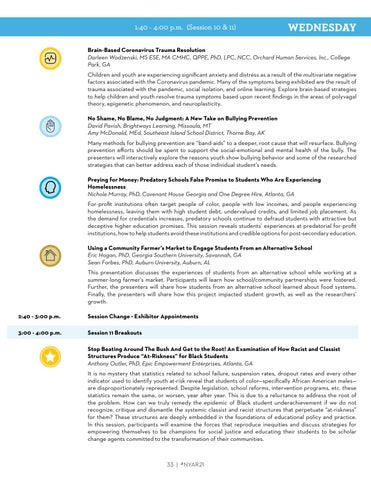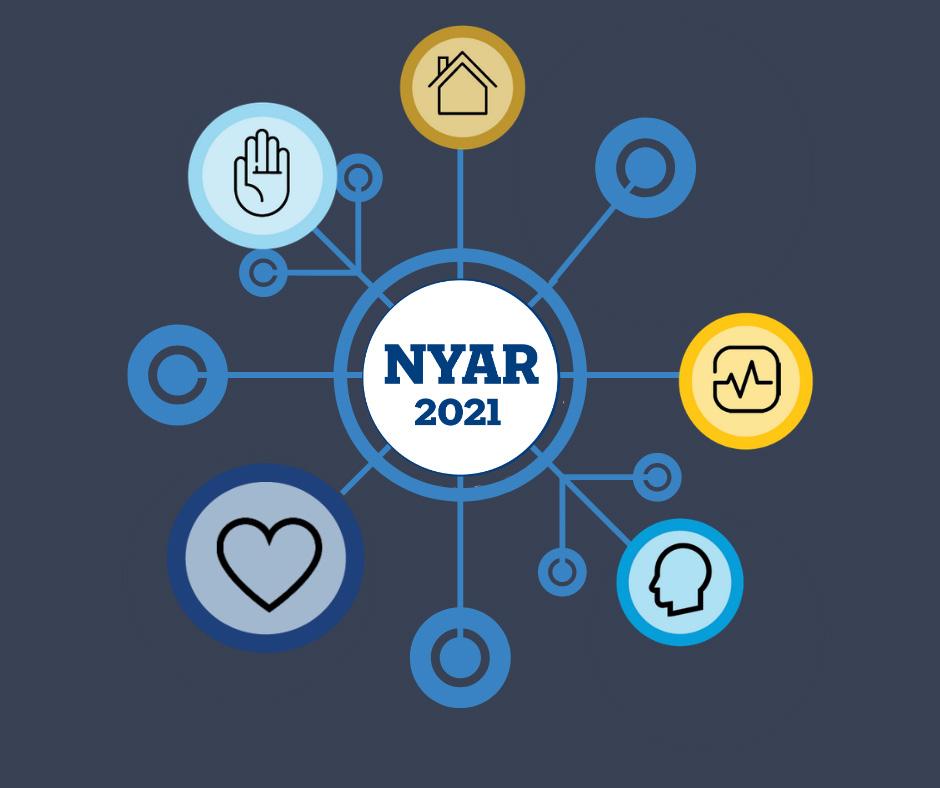1:40 - 4:00 p.m. (Session 10 & 11)
WEDNESDAY
Brain-Based Coronavirus Trauma Resolution Darleen Wodzenski, MS ESE, MA CMHC, QPPE, PhD, LPC, NCC, Orchard Human Services, Inc., College Park, GA Children and youth are experiencing significant anxiety and distress as a result of the multivariate negative factors associated with the Coronavirus pandemic. Many of the symptoms being exhibited are the result of trauma associated with the pandemic, social isolation, and online learning. Explore brain-based strategies to help children and youth resolve trauma symptoms based upon recent findings in the areas of polyvagal theory, epigenetic phenomenon, and neuroplasticity. No Shame, No Blame, No Judgment: A New Take on Bullying Prevention David Pavish, Brightways Learning, Missoula, MT Amy McDonald, MEd, Southeast Island School District, Thorne Bay, AK Many methods for bullying prevention are “band-aids” to a deeper, root cause that will resurface. Bullying prevention efforts should be spent to support the social-emotional and mental health of the bully. The presenters will interactively explore the reasons youth show bullying behavior and some of the researched strategies that can better address each of those individual student’s needs. Preying for Money: Predatory Schools False Promise to Students Who Are Experiencing Homelessness Nichole Murray, PhD, Covenant House Georgia and One Degree Hire, Atlanta, GA For-profit institutions often target people of color, people with low incomes, and people experiencing homelessness, leaving them with high student debt, undervalued credits, and limited job placement. As the demand for credentials increases, predatory schools continue to defraud students with attractive but deceptive higher education promises. This session reveals students’ experiences at predatorial for-profit institutions, how to help students avoid these institutions and credible options for post-secondary education. Using a Community Farmer’s Market to Engage Students From an Alternative School Eric Hogan, PhD, Georgia Southern University, Savannah, GA Sean Forbes, PhD, Auburn University, Auburn, AL This presentation discusses the experiences of students from an alternative school while working at a summer-long farmer’s market. Participants will learn how school/community partnerships were fostered. Further, the presenters will share how students from an alternative school learned about food systems. Finally, the presenters will share how this project impacted student growth, as well as the researchers’ growth. 2:40 - 3:00 p.m.
Session Change • Exhibitor Appointments
3:00 - 4:00 p.m.
Session 11 Breakouts Stop Beating Around The Bush And Get to the Root! An Examination of How Racist and Classist Structures Produce “At-Riskness” for Black Students Anthony Outler, PhD, Epic Empowerment Enterprises, Atlanta, GA It is no mystery that statistics related to school failure, suspension rates, dropout rates and every other indicator used to identify youth at-risk reveal that students of color—specifically African American males— are disproportionately represented. Despite legislation, school reforms, intervention programs, etc. these statistics remain the same, or worsen, year after year. This is due to a reluctance to address the root of the problem. How can we truly remedy the epidemic of Black student underachievement if we do not recognize, critique and dismantle the systemic classist and racist structures that perpetuate “at-riskness” for them? These structures are deeply embedded in the foundations of educational policy and practice. In this session, participants will examine the forces that reproduce inequities and discuss strategies for empowering themselves to be champions for social justice and educating their students to be scholar change agents committed to the transformation of their communities.
33 | #NYAR21



